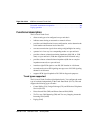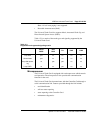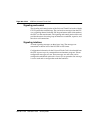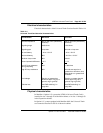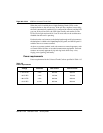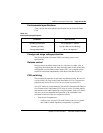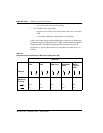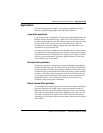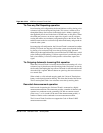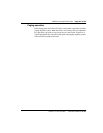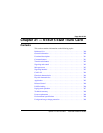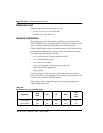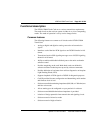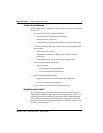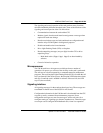
Page 386 of 544 NT8D14 Universal Trunk Card
553-3011-100 Standard 14.00 January 2002
Tie Two-way Dial Repeating operation
In an incoming call configuration, the far end initiates a call by placing a low
resistance loop across the tip and ring leads. This causes a current to flow
through the battery feed resistors in the trunk circuit. Address signaling is
then applied by the far end in the form of DTMF tones or dial pulses. When
the called party answers, an answer supervision signal is sent by software,
causing the trunk to reverse battery and ground signals to the far end. The far
end then removes the low resistance loop and normal battery and ground are
restored at the system.
In an outgoing call configuration, the Universal Trunk is connected to another
PBX by a Tie trunk. An outgoing call from the system seizes the trunk facility
by placing a low resistance loop across the tip and ring leads. Outward
addressing is then applied from the system in the form of DTMF tones or dial
pulses (battery/ground pulsing). If answer supervision is provided by the far
end, reverse battery is received, which provides a disconnect supervision
signal.
Tie Outgoing Automatic Incoming Dial operation
When the Universal Trunk is seized by the far end on an incoming call, a low
resistance loop is placed across the tip and ring leads. Dial pulses are sent by
the far end by interrupting the loop current. The trunk is released at the far end
when the loop is opened. When it detects an open loop, the near end reverts
to a normal state.
When seized as a dial-selected outgoing trunk, the Universal Trunk places
battery on the tip and ground on the ring. This alerts the far end of the seizure.
The far end responds with a low resistance across the tip and ring leads.
Recorded Announcement operation
In this mode of operation, the Universal Trunk is connected to a digital
announcement machine. The announcer provides a number of channels and
operates in a continuous mode, generating 150-300 ms common control
pulses every 7 or 14 seconds (at the start of the announcement period). A
number of trunks can be connected to one announcement machine.
The Universal Trunk Card does not support the Code-A-Phone 210DC
announcement recorder.



